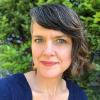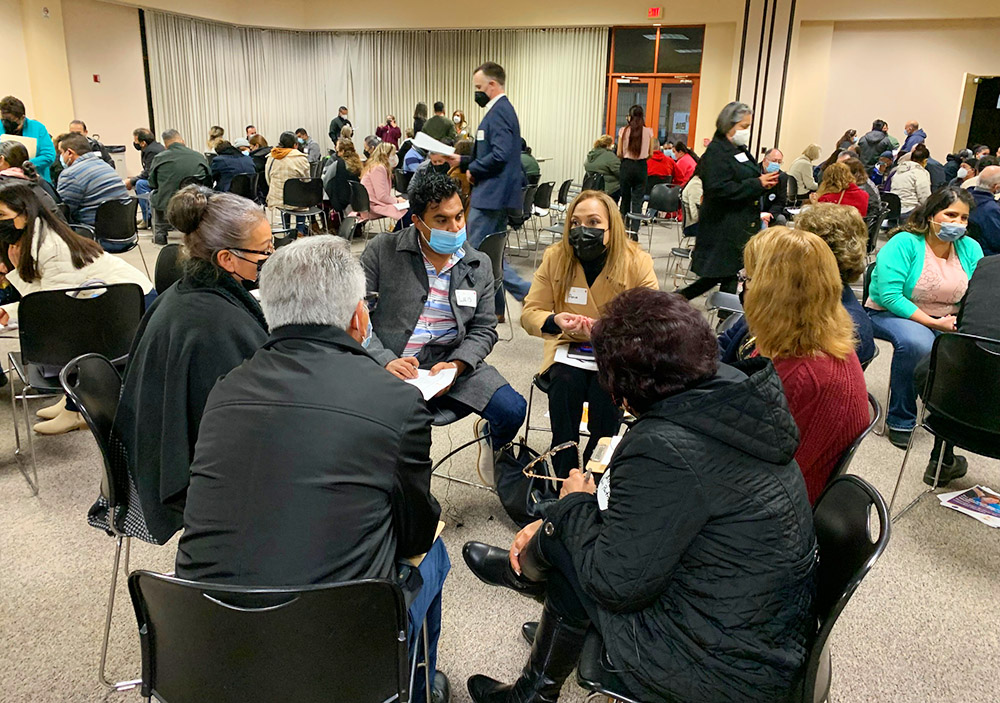
A synod training session is held by Communities Organized for Relational Power in Action (COPA) — part of the West/Southwest Industrial Areas Foundation network — at a parish in the Diocese of Monterey, California, last January. COPA community organizers trained around 500 Catholics to conduct synodal listening sessions in the region. (Courtesy of Tim McManus)
When Pope Francis launched his newly invigorated process for the Synod of Bishops in 2021, he challenged Catholics worldwide to "become experts in the art of encounter," saying it was "time to look others in the eye and listen to what they have to say, to build rapport, to be sensitive to the questions of our sisters and brothers."
For decades, members of the Industrial Areas Foundation (IAF), a network of local faith and community-based organizations, have in many ways been experts in such an art, most often to empower marginalized communities.
Bishop Mark Seitz of El Paso, Texas, is a longtime supporter of his area's West/Southwest IAF affiliate, El Paso Interreligious Sponsoring Organization (EPISO)/Border Interfaith.
"They've developed a process of attentive listening over the years, talking to people about their lives and identifying the needs of a particular group," said Seitz. "When we were trying to create a process for the synod, it occurred to me it was exactly the approach they'd long taken."
Seitz, along with a number of other American church leaders, reached out to IAF affiliates for their assistance during the first phase of the synod process, which involved listening sessions in dioceses across the country with some 700,000 Catholics before release of a national report in August.
EPISO/Border Interfaith was "integral to the process here," Seitz told NCR. "They did a wonderful job."
'We essentially have been training people to listen very hard and carefully.'
—Surya Kalra
Among those also asking an IAF affiliate for help was Bishop Daniel Flores of Brownsville, Texas, who is overseeing the entire U.S. church's participation in the global synod.
With the end of the first phase of the three-year synod process — which will now involve meetings at the continental level before culminating with two gatherings in Rome in October 2023 and October 2024 — some IAF affiliates are reengaging parish leaders who worked on the synod. They are helping the leaders take action on a range of issues that emerged through listening sessions — from anxiety and depression in young people to a lack of affordable health care.
"Along with the big questions raised during the synodal process, we also heard about many local issues," said Surya Kalra, lead organizer with EPISO/Border Interfaith. "So we are working with parish leaders to continue discerning them and go deeper in addressing them."
This fall in Rome, days before the pope extended the global synod by a year, he met with a delegation of 20 West/Southwest IAF organizers and leaders for 90 minutes, offering encouragement for their continued work in the synodal process as well as for their longtime organizing efforts within their broader communities.
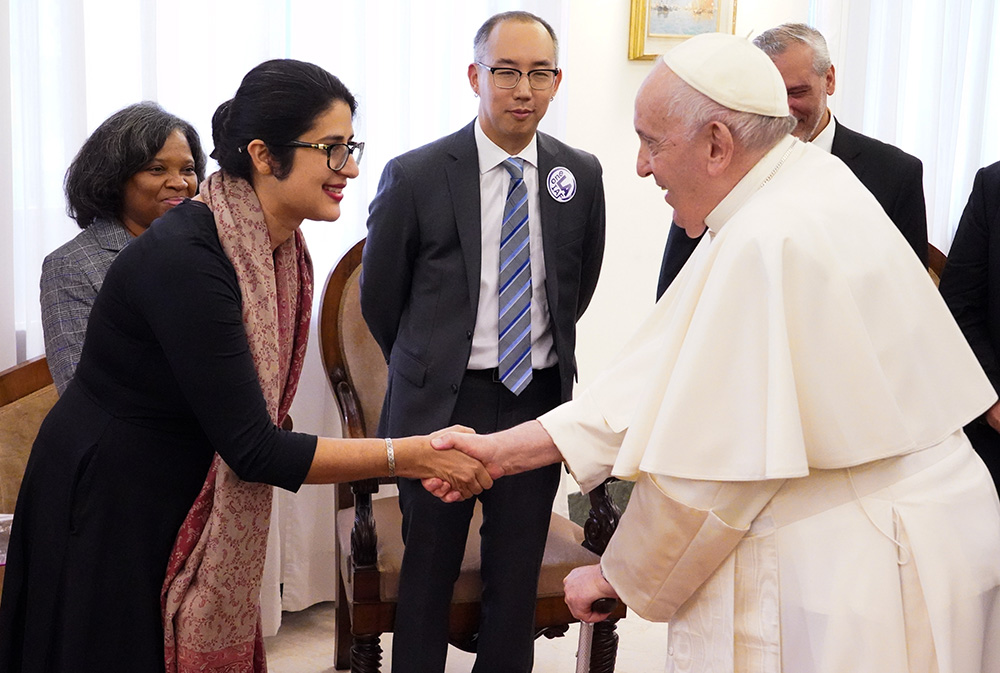
Surya Kalra, lead organizer with EPISO/Border Interfaith of El Paso, Texas, is greeted by Pope Francis in his residence, the Domus Sanctae Marthae, in Rome this fall. Robert Hoo, lead organizer with One LA-IAF in California, looks on. Kalra and Hoo were part of an interfaith delegation of 20 community organizers and leaders who met with the pope and received encouragement for their work in the synod and for their longtime organizing efforts. (Courtesy of West/Southwest Industrial Areas Foundation)
"For the pope to spend that type of time with organizers from the United States, it's rededicated us to organizing and staying in the fray," said Joe Rubio, national IAF co-director for the West/Southwest. "We are in a time of extreme polarization, and this process of listening and discerning, of really being able to enter each other's lives and feel obligated to one another — I think it can create a difference in a moment like this."
In the trenches
The Industrial Areas Foundation, founded in 1940, has 65 affiliates in the United States and several other countries, with U.S. projects organized into two regions: Metro IAF and West/Southwest IAF.
The organizing structure starts at the local level. A range of members — parishes, synagogues, schools, labor unions, nonprofits and civic organizations — form regional affiliates like EPISO/Border Interfaith in El Paso and Valley Interfaith in Brownsville. Most organizations assisting with the synod were among the 31 affiliates under the umbrella of West/Southwest IAF.
The organizations are nonpartisan and "are particularly about helping those on the margins enter public life," said Rubio. "They organize so that low-, middle- and other income communities can build relationships in interdenominational ways, in nondenominational ways, so they can have a voice in local and political matters."
IAF and the West/Southwest network have long, deep connections with Catholics and Catholic social teaching, Rubio said, and have had "an impact on a slew of social justice issues: things like standing with immigrants, water and sewer along the border, housing, job training, workforce projects, living wage efforts and health care."
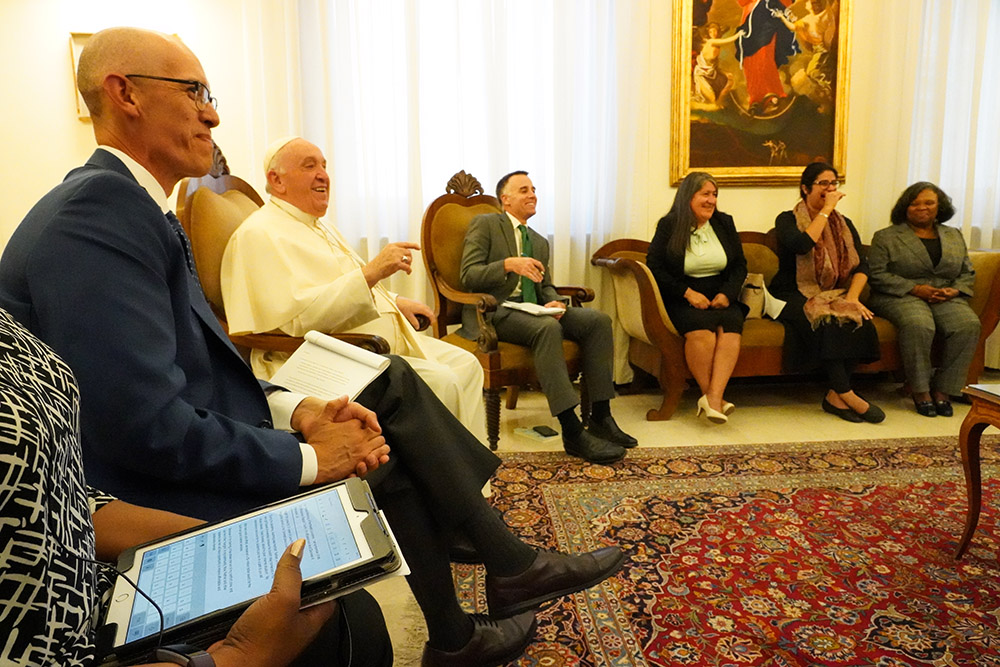
Members of the West/Southwest Industrial Areas Foundation network, including Colorado-based organizer Jorge Montiel, left, share a laugh with the pope during a 90-minute meeting with the pontiff in Rome. "For the pope to spend that type of time with organizers from the United States, it's rededicated us to organizing and staying in the fray," said Joe Rubio, national IAF co-director for the West/Southwest. (Courtesy West/Southwest Industrial Areas Foundation)
Jorge Montiel, lead organizer for Coloradans for the Common Good and Mountain Voices Project, left his corporate job to pursue organizing as a vocation.
"I lost my dad because he did not have appropriate health insurance," said Montiel. "IAF taught me what I could do to help others like my dad and what I was called to do as a Catholic."
A key part of the IAF methodology is "house meetings," or small group discussions in informal settings. They are held in various spaces, including at churches with pastors and parishioners, and from these gatherings issues surface to be addressed in the community. Organizers then empower parish leaders to take action.
"They engage in the political process, talk to their local leaders, and raise awareness with appropriate leadership, whether at the city or county or state level, to have an issue addressed," Flores explained.
For example in 2019, as the Trump administration cracked down on undocumented migrants, Dallas Area Interfaith* learned through house meetings that many parishioners in the Dallas area were without legal documents and afraid to leave their homes. So the IAF affiliate worked with local officials and police chiefs to develop a parish identification card program.
West/Southwest IAF affiliates also secured running water for 1 million people in Texas' colonias, or unincorporated communities along the U.S.-Mexico border. And in California, Communities Organized for Relational Power in Action (COPA) helped establish Esperanza Care, which provides basic health care to vulnerable immigrants.
Assisting with the synod
Flores pointed to the many commonalities between the synodal process and the methods long used by IAF affiliates. "First, they encourage people to gather, listening to people, hearing what's on their minds, what their worries are and what preoccupies them, then making things better as a local community," said the bishop. "That very basic element is close to the synodal style."
Seitz said he wasn't sure at first if EPISO/Border Interfaith would assist with the synod in the El Paso region, since it was not an IAF "program or process per se."
Advertisement
But the organizers agreed and "were very generous and helpful," the bishop said.
While many of the organizers were Catholic, some were not. Seitz felt that aligned with the pope's vision for the synodal process. "We understand that we are being asked to reach beyond the walls of the church, beyond religious affiliation," he said. "We can learn a lot from people not in the church."
In addition to offering assistance in the El Paso and Brownsville dioceses, West/Southwest IAF affiliates helped in Texas' San Antonio and Galveston-Houston archdioceses and in California within the Monterey and San Bernardino dioceses. They also provided support to individual parishes in San Jose, California; Phoenix; Oklahoma City; and Grand Rapids, Michigan, and to a Catholic nonprofit in Northern California.
"We essentially have been training people to listen very hard and carefully," said Kalra, with EPISO/Border Interfaith.
Organizers "taught people how to listen to others' pain and joy without getting defensive, without wanting to solve the issue," added Elizabeth Valdez, Texas IAF director. "Just letting them be able to share and then asking them what they want to do about it."
Valdez said there have been hundreds of house meetings for the synod, and in El Paso, close to 300 people were trained by EPISO/Border Interfaith. In Monterey, COPA conducted six trainings for some 500 parish leaders, who then led synodal listening sessions.
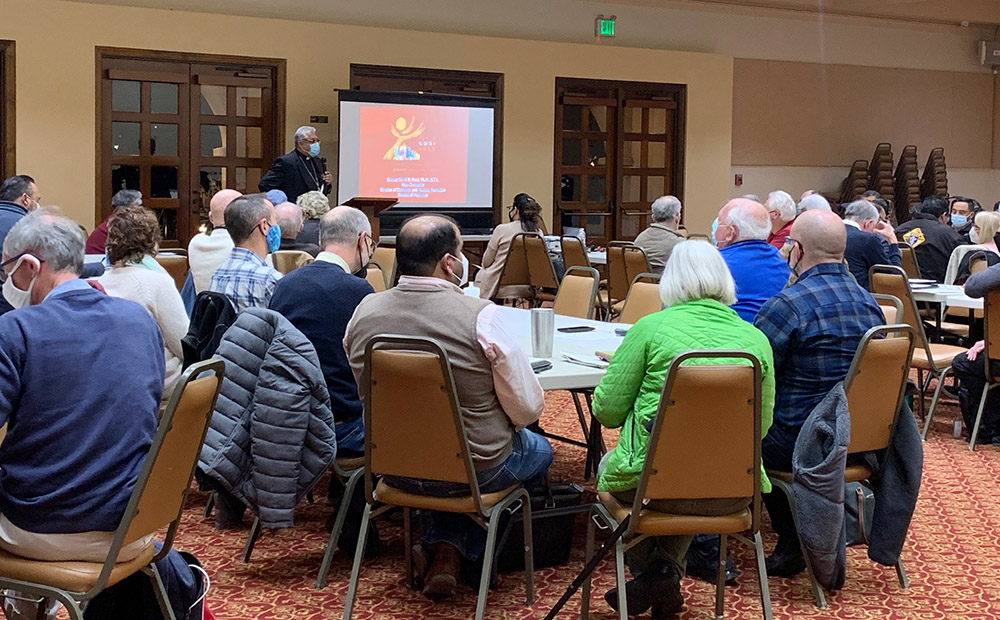
Bishop Daniel Garcia of Monterey, California, speaks during a February synod training for parish leaders organized by Communities Organized for Relational Power in Action. Garcia was among several U.S. bishops who asked IAF-affiliated organizations to help train parish leaders during the first phase of the worldwide synod. (Courtesy Tim McManus)
Tim McManus, lead organizer with COPA, said his organization helped parish leaders learn to facilitate synodal conversations and "how to get people to turn up, not just the regulars." COPA organizers also followed up to see how the sessions went.
Valley Interfaith did not "manage the synod" in his diocese, Flores said, and there's a "certain skillset in an ecclesial setting that may take different forms than Valley Interfaith's approach."
But Valley Interfaith's assistance was important, he said, especially in the colonias and areas that lack a permanent pastor.
Flores noted the "heavy doctrinal issues" that have come up in the synodal process — such as concerns raised by LGBTQ communities — "will have to be dealt with at the level of the universal church and by the pope himself." But he said there are many local issues that emerged that can be addressed now.
These include practical matters like requests for more bathrooms at a parish or the need for stronger catechesis programs. Several West/Southwest organizations will continue working with parish leaders to address many of the issues raised.
"Even if it's not all seen as part of the official synod, I think it's work that's very much in line with what the synod is trying to do," said Kalra.
Flores said the synodal style "of listening and attentiveness has been reinvigorated" this past year "and that will go on and have a lasting effect." Organizers within the IAF network, meanwhile, said they plan to maintain support for this synodal style.
Valdez pointed out that the first phase was "really the beginning of a transformation."
'We can't just do things from the top down. The Holy Spirit wants to make the whole people of God a priestly people, and that means that everyone is involved.'
—Bishop Mark Seitz
In a recent podcast, Seitz said the synod is not just another "project" that must be completed and we "get back to our life."
The bishop said he believes the pope has been inspired by the Holy Spirit "to change the way that we work in the church."
"We can't just do things from the top down," said Seitz. "The Holy Spirit wants to make the whole people of God a priestly people, and that means that everyone is involved."
'Amor concreto'
Pre-synod, the Industrial Areas Foundation began working with the U.S. bishops' conference on an initiative that's helped parishes identify, train and mentor immigrant leaders. Called "Recognizing the Stranger" it's been supported by the Catholic Campaign for Human Development.
According to Rubio, this initiative, coupled with involvement in the synod, "helped pave the way" for the meeting with Francis.
During the visit in the pope's residence this October, the interfaith West/Southwest IAF delegation shared their role in the synod as well as the network's ongoing, at times challenging, efforts to bring about positive local change in their communities.
"He told us, 'When I read the protocol by which we are going to be judged — you saw me hungry and you fed me, you saw me naked and clothed me — I see that in all you do,' " recalled Montiel, the lead organizer in Colorado.
"The pope also said, 'Yes, you're going to be told not to meddle in political issues, going to be told this is just communist stuff. But keep going,'" he said. "That was a great confirmation, a validation that we are on the right path."
Participants described the visit as relaxed and story-filled and said it left them eager to continue serving the synodal process in any way they can going forward.
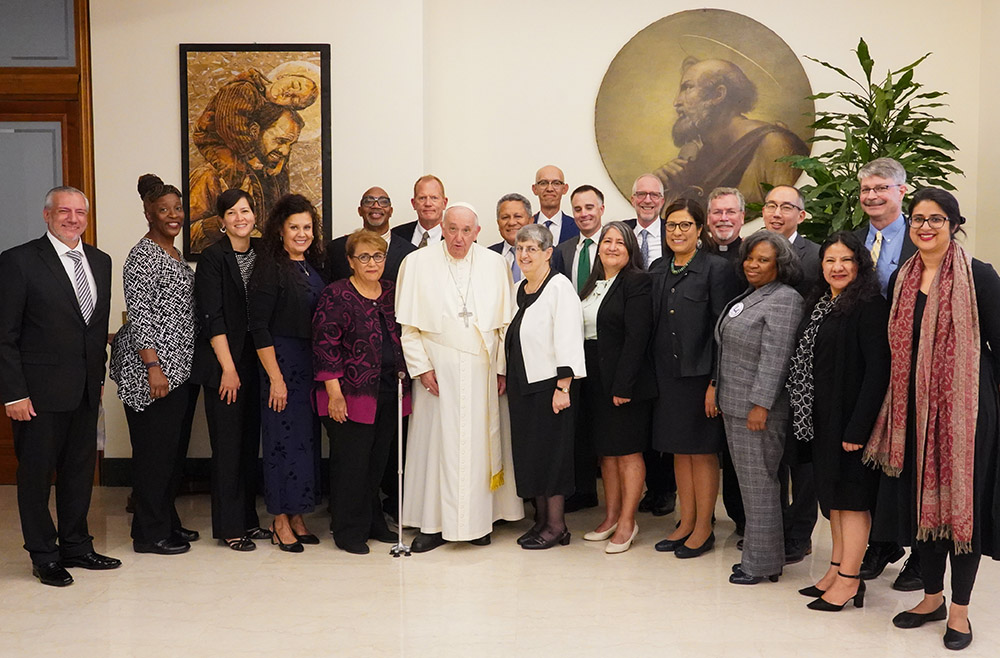
The interfaith delegation from the West/Southwest Industrial Areas Foundation network poses with Pope Francis during their October visit in Rome. The pope said, "'Yes, you're going to be told not to meddle in political issues, going to be told this is just communist stuff. But keep going,'" recalled Colorado organizer Jorge Montiel. "That was a great confirmation, a validation that we are on the right path." (Courtesy of West/Southwest Industrial Areas Foundation)
"We told him we'll report back in a year about our work in the synod," said Robert Hoo, lead organizer with One LA-IAF in California.
Hoo felt the pope deeply understood the work they've long engaged in and how it leaves an imprint on organizers.
"We listen and build relationships with those who are different and who maybe come from a different religious background, racial and ethnic background, and political perspective, and then build a common agenda and must be patient about it," said Hoo.
"It shouldn't be countercultural but it is," he said. "And the pope resonated with that. He said, 'I'm hearing your stories, and you are with people, you are listening to people, and you are transformed by it.' "
Rabbi John Linder from Phoenix gave the pope a leather-bound and gold-leaf Hebrew Bible during the visit.
"The most important commandment is to love your neighbor as yourself," the rabbi said, "but what does that look like?"
"Pope Francis said it's about 'amor concreto,' or 'concrete love,' " recalled Linder. "And that means being with people, paying attention to their needs — for example figuring out that a community needs water or needs electricity.
"Amor concreto," Linder said. "That will stay with me forever."
*This story has been updated to correctly identify the organization Dallas Area Interfaith.
